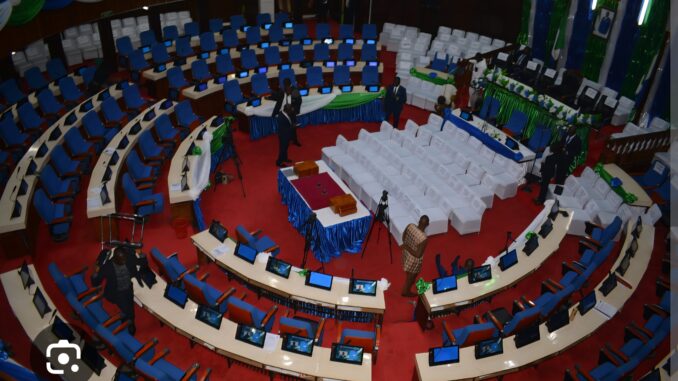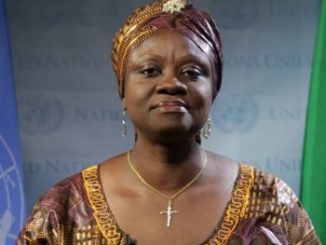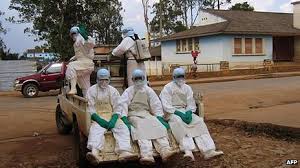
*CRISIS IN PARLIAMENT: NEUTRALITY UNDERMINED OR OPPOSITION REBRAND? THE DEMOCRATIC STAKES IN SIERRA LEONE*
By Mahmud Tim Kargbo
Wednesday, 11 June 2025
Sierra Leone’s Parliament has entered a new phase of political tension following the announcement by the main opposition party of its immediate suspension from all parliamentary sittings and committee engagements. The decision, issued on Tuesday 10 June 2025, comes amid allegations that the Clerk of Parliament is actively seeking a political party executive position while still holding his administrative office.
According to the official press statement from Hon. Abdul Kargbo, Leader of the Opposition, the Clerk’s partisan involvement violates the expectations of neutrality and threatens the institutional integrity of Parliament. A formal letter was sent to the Speaker of Parliament prior to the announcement, requesting the Clerk’s resignation or dismissal. The Speaker has indicated he will respond within one week.
“We believe this development undermines the neutrality and integrity of the Clerk’s office, which is expected to be strictly nonpartisan in its service to Parliament,” the statement reads. “While we await the Speaker’s response, we are taking this principled stand by withdrawing from all parliamentary proceedings. Our action is not intended to disrupt governance but to safeguard the ethical standards that underpin our democracy.”
While the opposition presents this move as a defence of constitutional order, the public response has been mixed. Many view the action as long overdue in terms of principle, but question the timing and consistency of the main opposition party’s stance.
*CLERK’S CONDUCT RAISES SERIOUS CONSTITUTIONAL QUESTIONS:*
The controversy hinges on whether the Clerk of Parliament, a civil servant and chief administrative officer of the legislature, can lawfully engage in partisan politics while in office. The opposition says no, and legal experts appear to agree.
“This is not just about internal politics. It’s about preserving the credibility of Parliament itself,” one senior MP remarked.
Under Section 170(1) of the 1991 Constitution of Sierra Leone, public officials are prohibited from using their positions for partisan advancement.
Read the Constitution here: https://www.sierra-leone.org/Laws/constitution1991.pdf
The Anti-Corruption Act of 2008 (as amended) also identifies conflicts of interest and partisan interference in public service as serious violations.
View the full Act: https://www.anticorruption.gov.sl/pages/acts-and-regulations
As the Clerk oversees committee work, maintains legislative records and facilitates due process, any involvement in party politics raises immediate concerns about fairness, confidentiality and trust in the legislative process.
*A RECORD OF SELECTIVE ACCOUNTABILITY:*
Despite the legal merit of the opposition’s protest, the timing has drawn criticism. Many civil society leaders and members of the public point to the main opposition party’s history of silence in the face of executive overreach and exploitative foreign agreements.
“Where was this level of principled action when billions in resource contracts were handed out without transparency or accountability?” asked a Port Loko-based civil society advocate.
For over a decade, Sierra Leone has signed numerous international agreements in mining, energy, infrastructure and fisheries that civil society organisations say disproportionately favour foreign interests while delivering little benefit to ordinary Sierra Leoneans.
Groups such as the Centre for Accountability and Rule of Law (CARL) have repeatedly flagged these issues.
Read CARL reports: https://www.carl-sl.org/
The Natural Resource Governance Institute (NRGI) has also published extensive data highlighting Sierra Leone’s poor performance on extractives governance and contract transparency.
See NRGI data: https://resourcegovernance.org/our-work/country/sierra-leone
Yet in those moments, the main opposition party rarely raised its voice or took formal action, including boycotts or parliamentary investigations. The contrast is not lost on the public, who question whether this latest protest is a sincere defence of democracy or a politically motivated gesture ahead of the 2028 general elections.
*POLITICAL PRINCIPLE OR STRATEGIC THEATRE?*
The opposition’s official statement speaks of “institutional integrity” and the need to “safeguard democracy,” but it stops short of acknowledging its own legislative failings or offering any plan for long-term reform.
“The people are not fooled. For years they’ve said nothing, and now suddenly they care about process and ethics?” remarked a political analyst in Bo.
If the protest remains narrowly focused on the Clerk’s behaviour without addressing the systemic weaknesses in Parliament’s role as a check on executive power, its impact will be minimal. Inaction during critical policy failures, contrasted with protest over internal political grievances, undermines the credibility of the message.
*RISKS TO GOVERNANCE AND NATIONAL STABILITY:*
The consequences of the protest are not merely symbolic. If extended, it could have lasting effects on governance and legislative performance:
Legislative Paralysis: Committee work, including oversight of national budgets and public investment projects, will be significantly delayed. Though the nation is yet to see any substantial progress in this area, further stagnation only worsens public service delivery.
Public Disillusionment: Voters increasingly perceive both ruling and opposition parties as self-interested. The lack of principled, issue-based governance has deepened distrust in Parliament as a national institution.
Weakening of Accountability Mechanisms: If boycotts are reserved only for internal political grievances rather than broader governance issues, Parliament risks abandoning its core function as the people’s watchdog.
This moment has exposed not just a personnel issue within Parliament, but a broader crisis of political purpose.
*WHAT THE MAIN OPPOSITION PARTY MUST DO NEXT:*
If the main opposition party wants to move beyond performative politics and demonstrate real leadership, it must adopt a broader and more consistent agenda for reform.
1. Acknowledge Past Complicity
The party must publicly recognise its silence during previous contract signings and governance failures, especially where they could have demanded accountability.
2. Initiate Contract Reviews
Call for a parliamentary inquiry into major agreements signed between 2020 and 2025, especially those involving natural resources and infrastructure. In addition, the opposition party should pressure the Executive Branch based on the law, to review all contracts that are not in the national interest and recommend renegotiation or cancellation as needed.
3. Enforce the Civil Service Code of Ethics
There is no need for new legislation in this area. The Civil Service Code of Ethics already prohibits civil servants and administrative staff from engaging in active partisan politics while in office. What is required now is genuine enforcement of these provisions with a sense of national responsibility and institutional discipline, particularly in senior posts like the Clerk of Parliament.
4. Collaborate with Civil Society
The party should partner with credible watchdog organisations and governance experts to develop a public framework for contract transparency, procurement oversight and citizen engagement in parliamentary processes.
5. Apply Protest Principles Consistently
If walkouts and boycotts are to be used as instruments of principle, they must be applied consistently to defend national interests, not just when internal party dynamics are threatened.
*THIS IS A DEFINING MOMENT:*
The Clerk’s alleged misconduct is a serious matter, and the main opposition party is within its rights to raise concerns and demand accountability. But the moral weight of this protest depends on whether it marks the start of a new, principled chapter in parliamentary engagement or remains a one-off tactic to score political points.
Sierra Leoneans have long endured political betrayal, weak governance and economic hardship. They deserve representatives who act with consistency, transparency and genuine commitment to public service.
This moment is a test of whether the main opposition party is prepared to be more than a reactionary force. The nation is watching and this time, it will remember.




Leave a Reply